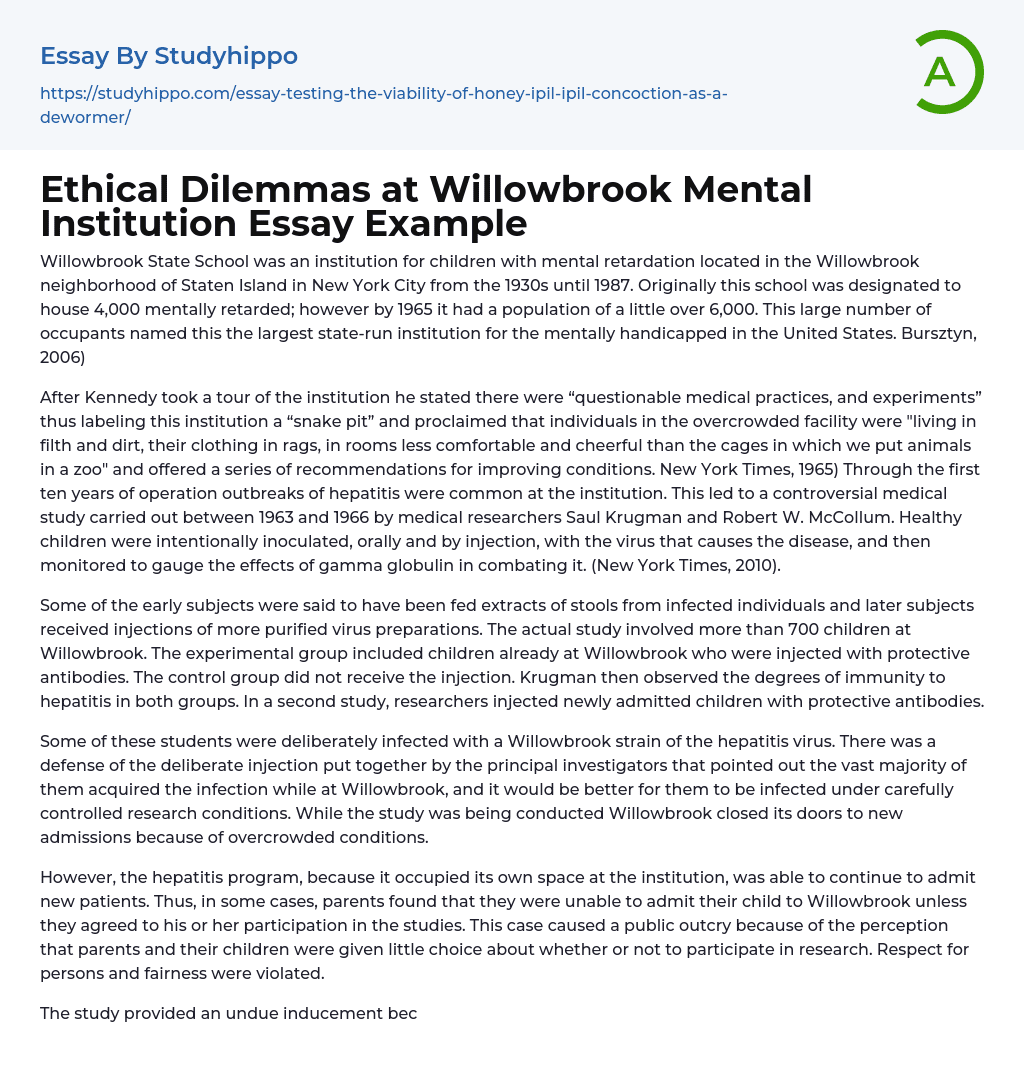

Ethical Dilemmas at Willowbrook Mental Institution Essay Example
Willowbrook State School was an institution for children with mental retardation located in the Willowbrook neighborhood of Staten Island in New York City from the 1930s until 1987. Originally this school was designated to house 4,000 mentally retarded; however by 1965 it had a population of a little over 6,000. This large number of occupants named this the largest state-run institution for the mentally handicapped in the United States. Bursztyn, 2006)
After Kennedy took a tour of the institution he stated there were “questionable medical practices, and experiments” thus labeling this institution a “snake pit” and proclaimed that individuals in the overcrowded facility were "living in filth and dirt, their clothing in rags, in rooms less comfortable and cheerful than the cages in which we put animals in a zoo" and offered a series of recommendations for improving conditions. Ne
...w York Times, 1965) Through the first ten years of operation outbreaks of hepatitis were common at the institution. This led to a controversial medical study carried out between 1963 and 1966 by medical researchers Saul Krugman and Robert W. McCollum. Healthy children were intentionally inoculated, orally and by injection, with the virus that causes the disease, and then monitored to gauge the effects of gamma globulin in combating it. (New York Times, 2010).
Some of the early subjects were said to have been fed extracts of stools from infected individuals and later subjects received injections of more purified virus preparations. The actual study involved more than 700 children at Willowbrook. The experimental group included children already at Willowbrook who were injected with protective antibodies. The control group did not receive the injection. Krugman then observed the degrees
of immunity to hepatitis in both groups. In a second study, researchers injected newly admitted children with protective antibodies.
Some of these students were deliberately infected with a Willowbrook strain of the hepatitis virus. There was a defense of the deliberate injection put together by the principal investigators that pointed out the vast majority of them acquired the infection while at Willowbrook, and it would be better for them to be infected under carefully controlled research conditions. While the study was being conducted Willowbrook closed its doors to new admissions because of overcrowded conditions.
However, the hepatitis program, because it occupied its own space at the institution, was able to continue to admit new patients. Thus, in some cases, parents found that they were unable to admit their child to Willowbrook unless they agreed to his or her participation in the studies. This case caused a public outcry because of the perception that parents and their children were given little choice about whether or not to participate in research. Respect for persons and fairness were violated.
The study provided an undue inducement because students were given a coveted spot in Willowbrook in a newer part of the facility if they participated in the research. Parents and their children were not truly informed about the risks of the study. Children in a mental health facility can’t fully understand the risks of a study they are participating in. The methods by which children were recruited are also questionable. Parents were unduly induced to give their consent.
The public outcry over this case was largely due to the impression that parents had little choice over whether or not to participate in the
research. Parents who wanted care for their children may not have had any other options. It is not appropriate to use a vulnerable, institutionalized population for experiments. Feeding live hepatitis virus to mentally disabled children in order to deliberately infect them does not respect them as persons. (Boylin, Scott, 2006)
- Hospital essays
- Physician essays
- Health Care Provider essays
- Universal Health Care essays
- Readmission essays
- Birth Control essays
- Drug Addiction essays
- Eating Disorders essays
- Epidemiology essays
- Hiv essays
- Hygiene essays
- Obesity essays
- Social Care essays
- Teenage Pregnancy essays
- Belief essays
- Deontology essays
- Ethical dilemma essays
- Moral essays
- Normative Ethics essays
- Values of Life essays
- Virtue essays
- Virtue Ethics essays
- Work Ethic essays
- Addiction essays
- Anatomy and Physiology essays
- Biodegradation essays
- Cancer essays
- Dental Care essays
- Disability essays
- Disease essays
- Disorders essays
- Health Care essays
- Infectious Disease essays
- Inquiry essays
- Intelligence Quotient essays
- Lung Cancer essays
- Medicine essays
- Neurology essays
- Nutrition essays
- Olfaction essays
- Physical Exercise essays
- Public Health essays
- Sex essays
- Women's Health essays
- World health organization essays



